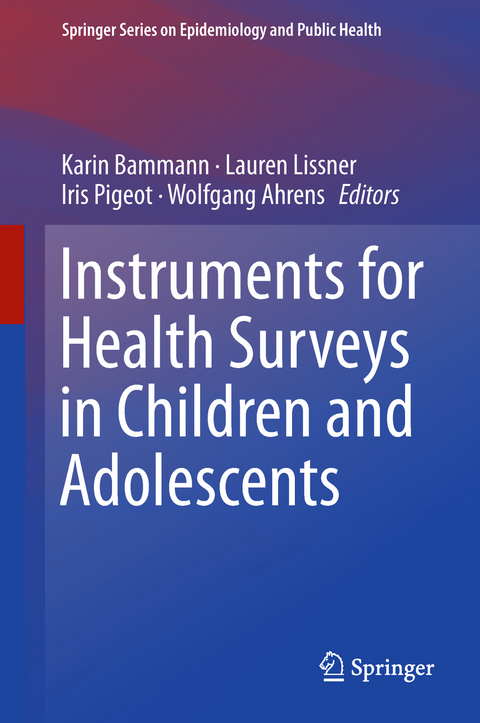
Instruments for Health Surveys in Children and Adolescents
Springer International Publishing (Verlag)
978-3-319-98856-6 (ISBN)
Studies encompassing childhood and adolescence face the particular challenge of the transitions from pre-school to primary school and from childhood to adolescence; accordingly, the instruments used need to be adapted to different developmental stages while maintaining their comparability across the age range. In young children, questionnaires have to be completed by proxies, usually their parents, while older children, particularly adolescents, can provide a major part of the requested information themselves.
This book presents suitable designs, methods and instruments for data collection in studies of children and adolescents. Each chapter explains the development and background of the instruments applied in the surveys and summarises the current state of knowledge. All chapters were written by key experts in their respective research fields. We are grateful for their valuable contributions and their enthusiastic support in producing this book, which also presents survey experiences in which practice does not always follow theory. Participants' responses can on occasion be unexpected and unpredictable, but meeting these challenges can also enrich epidemiological surveys and yield methodological refinements. We sincerely hope that the book and the online material will be of considerable value to other research teams.
Karin Bammann Department of Epidemiology of Demographic Change, Institute for Public Health and Nursing Research (IPP), University of Bremen, Germany Karin Bammann has been a Senior Researcher at the Department of Human and Health Sciences of the University of Bremen since 2011. Her teaching focuses on empirical and epidemiological methods, project management, and lifestyle related diseases. As head of the Department of Epidemiology of Demographic Change at the Institute for Public Health and Nursing Research (IPP), she has extensive experience in conducting and managing epidemiological studies, and in primary data collection. Her research currently concentrates on health and disease during the life course, and on physiological, social and contextual determinants thereof. A second focus is on empirical research methodologies, especially on the application of mixed methods and participatory research methods in Public Health and epidemiology. She was an international scientific manager and responsible for instruments, standardisation and quality management in the largest pan-European children's cohort, including more than 18,000 children, the IDEFICS cohort. She has published more than 80 international peer-reviewed papers, 11 book chapters, and three books.
0 Preface.- 1 The IDEFICS/I.Family studies: design and methods of a large European child cohort.- 2 MODYS - a modular control and documentation system for epidemiological studies .- 3 Physical examinations.- 4 Biological samples - Standard Operating Procedures for collection, shipment, storage and documentation.- 5 Web-based 24-Hour Dietary Recall: the SACANA program.- 6 Dietary behaviour in children, adolescents and families: the Eating Habits Questionnaire (EHQ).- 7 Accelerometry-based physical activity assessment for children and adolescents.- 8 Pre- and post-natal factors obtained from health records.- 9 Core questionnaires.- 10 Instruments for assessing the role of commercials on children's food choices.- 11 Process evaluation of the IDEFICS intervention.- 12 Assessment of sensory taste perception in children.- 13 Physical fitness.- 14 Interview on kinship and household.
| Erscheinungsdatum | 07.10.2018 |
|---|---|
| Reihe/Serie | Springer Series on Epidemiology and Public Health |
| Zusatzinfo | XVI, 301 p. 31 illus., 24 illus. in color. |
| Verlagsort | Cham |
| Sprache | englisch |
| Maße | 155 x 235 mm |
| Gewicht | 643 g |
| Themenwelt | Mathematik / Informatik ► Mathematik ► Wahrscheinlichkeit / Kombinatorik |
| Medizin / Pharmazie | |
| Schlagworte | Childhood Obesity • data collection • Dietary behavior • Large-scale international surveys • Multicenter field studies • Surveys of children and adolescents |
| ISBN-10 | 3-319-98856-5 / 3319988565 |
| ISBN-13 | 978-3-319-98856-6 / 9783319988566 |
| Zustand | Neuware |
| Haben Sie eine Frage zum Produkt? |
aus dem Bereich


